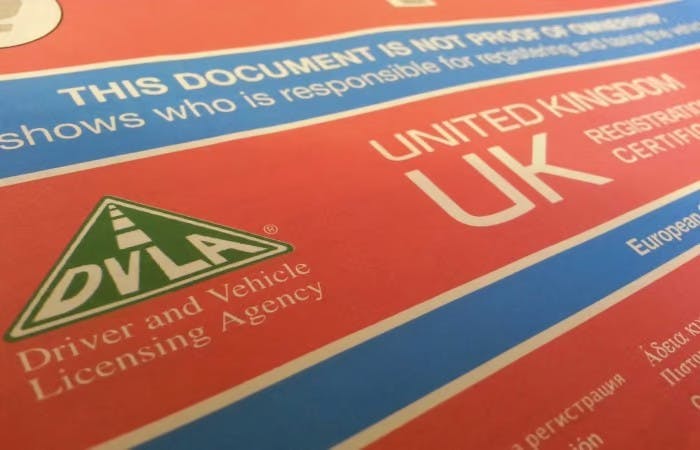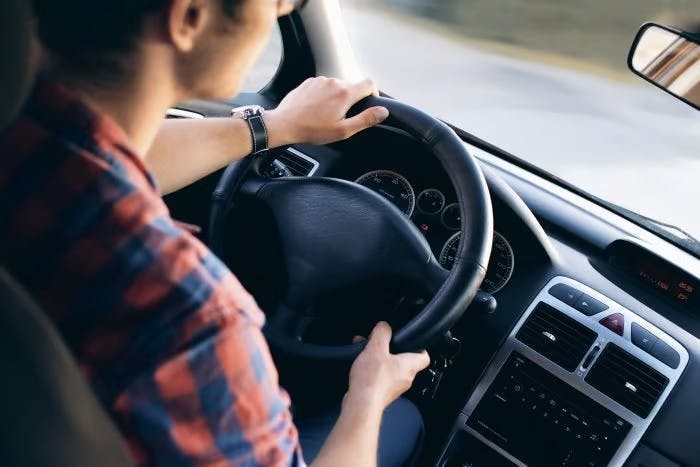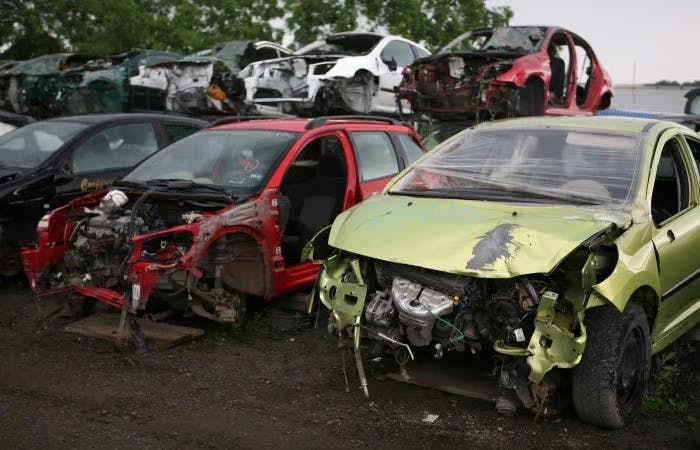
If you're a newly qualified driver, or someone who has taken a break from driving, who is getting around to buying a car for the first time, you might be a little bit confused by the sheer volume of jargon being thrown around. A popular query for many first time buyers is, “What is a vehicle log book?”. Otherwise known as the V5C, the vehicle log book has numerous important purposes, so it's absolutely vital that you know exactly what it is and when you might need it.
In this guide, we're going to explain what a vehicle log book is, the situations in which you will need one, how to order a replacement and much more. Get the full lowdown below!
What is a vehicle log book?
A vehicle log book, or V5C registration certificate, outlines who the registered keeper of a vehicle is. Your vehicle log book will contain a range of vital information, from personal details—like your name and address—to details about the car itself, e.g., its registration number, any modifications, previous registered keepers, its colour and engine size.
There are many situations in which you might need your vehicle log book. For starters, if you ever need to update your name or address, you will need to inform the DVLA. One of the ways you can do this is with a vehicle log book. You will need to do the same if you make any changes to your vehicle, e.g., modifications. Additional uses—which we'll delve further into below—include applying for a SORN, scrapping your vehicle and taxing your vehicle.
Now, it's vital to emphasise here that a vehicle log book is not proof that you own the car. It just shows that you are the registered keeper.
Who is the registered keeper?
The registered keeper of a vehicle might not necessarily be the same as the owner of the vehicle—it can vary. The owner is the individual who bought the vehicle and has physical proof to back it up (the V5C is not proof). The registered keeper, by comparison, is the individual who uses the car, taxes it and, ordinarily, is responsible for parking tickets and fines.
Wondering when the owner and registered keeper might not be the same individual? If it's a company car, the vehicle is owned by the company, however, the employee using it on a regular basis will likely be the registered keeper. Similarly, a newly qualified driver might be given a car as a present from their parents—making their parents the owner(s), and themselves the registered keeper.
How do I get a vehicle log book?

You will typically receive a vehicle log book when you buy a vehicle. If it's a brand new vehicle, the dealership will typically register the vehicle for you. Then, you'll receive your vehicle log book within 6 weeks or so. If the dealership doesn't do it for you, you can register your new vehicle yourself. If you're buying a used vehicle, the seller will either register the vehicle to you online or by post.
The DVLA urges drivers not to buy a vehicle unless it comes with a vehicle log book. Unfortunately, some sellers go to the trouble of forging or altering log books. The DVLA, however, have a few ways in which you can check you have the real deal right in front of you.
How to check your log book is legit
- Look for the DVLA watermark. Simply hold up your log book to the light and you should be able to see the official watermark.
- Check to see if the name under 'registered keeper' is the same as the person selling you the vehicle.
- The person selling you the vehicle should be at the same address displayed in the vehicle log book.
- Have a look at the serial number in the log book. If it's between BG8229501 to BG9999030, or BI2305501 to BI2800000, then the V5C might be stolen—in which case, you should contact the police when you can.
- Cross-check the vehicle identification number and engine number with the details in the log book.
When would I need a vehicle log book?

So, you now know what a vehicle log book is and how you might receive one. Next on the agenda? Figuring out when you might actually need to use one. Believe it or not, there are plenty of situations in which you'll need your V5C. We're going to take you through the main situations below...
Selling your car
If you're looking to sell your vehicle, you will usually need the 11-digit reference number found in your vehicle log book. You will also need to give the buyer the green 'new keeper' slip from said log book. Once you've done so, you need to inform the DVLA that you have sold your vehicle using this method.
You will then receive an email confirmation and letter from the DVLA confirming that you're no longer the registered keeper of the vehicle. You might also receive a refund cheque for any full months left on your vehicle tax. The new keeper will get an email confirmation and a new log book within 5 working days.
Scrapping your car
If you're looking to scrap your car, you will need to inform the DVLA—you could be fined up to £1,000 if you don't! The easiest way to do so is with your vehicle log book. You can scrap your car without it, however, you'd be looking at a lot of extra red tape.
If you're scrapping your vehicle and not keeping any parts, you will need to do so at an Authorised Treatment Facility (ATF), which is usually free. Then, you will need to give the ATF your log book—you will need to keep the yellow 'sell, transfer or part-exchange' section and send it over to the DVLA. You'll then get a letter within 4 weeks or so, confirming that you're no longer the registered keeper.
Drivers looking to keep parts from their scrapped vehicle will first have to declare their vehicle as off road. After you've done so, you'll be allowed to take parts from it—as long as it's off the road, e.g., in a garage. Then, you'll have to scrap it as we've laid out in the paragraph above.
Registering your car as off road
As discussed in length in our guide to the Statutory Off Road Notification (SORN), if you're no longer using your car, or scrapping it, then there's not much point to paying tax and insurance for it when you don't need to. If this is the case for you, you will need to declare your vehicle as off road. To apply for a SORN, you will need the 11-digit reference number from your vehicle log book. If you don't have it, you'll need the 16-digit reference number from your vehicle tax reminder letter (V11) instead.
Taxing your vehicle
To tax your vehicle, you will either need a recent reminder warning letter from the DVLA, or your vehicle log book. If you've only just bought the vehicle and you're looking to start taxing it for the first time, you will need the green 'new keeper' slip from a log book.
Updating personal information and changes to vehicle

You will also need your vehicle log book to inform the DVLA if there have been any changes to your name, address or vehicle. Before you start shrugging this off, you should know that if you don't update your log book correctly, you could be fined up to £1,000!1
Changing your address or name
The DVLA need to be able to keep in touch with you, which is why it's vital that you inform them when you've changed your address or name. To update your address, you will need to write your new address in section 3 if it's a new style log book (with multi-coloured numbered blocks on the front cover) or section 6 if it's an older style log book. You'll also need to change your driving licence address while you're at it!
If you've made changes to your name, you will need to write your new name in full in section 3 of your new style log book, or section 6 if it's an old style edition. You will also be required to include a separate note to tell the DVLA that you've changed your name.
Those updating both their address and name will need to include proof that their name has changed if it's not due to marriage or divorce, e.g., a deed poll.
You will need to send your log book and any additional information to the following:
DVLA
Swansea
SA99 1BA
Changes to your vehicle
Believe it or not, when you make changes to your vehicle, you actually have to inform the DVLA. Why? Any modifications you make might mean you have to pay more for your vehicle tax. Alternatively, the DVLA might not agree with your modifications and deem them unsafe.
If you're looking to make changes to the following, you will need to update your vehicle log book and get in touch with the DVLA:
- Colour
- Chassis or body shell (replaced or modified)
- Cylinder capacity
- Engine
- Fuel type
- Seating capacity
- Weight of a large vehicle
And that's not all! The DVLA also state that drivers need to update their V5C if they make changes to any of the following (as they might need further inspection):
- Body type, e.g., converting a van to a campervan
- Chassis number
- Frame number for motorbikes
- Wheel plan
- Vehicle identification number (VIN)
If you do need to update your V5C with these changes, you will need to compile any relevant evidence outlined by the DVLA, along with your log book. The address you send it to will vary depending on the type of changes you're making.
If it's for engine size, fuel type, weight of a goods vehicle or number of seats on a bus, then you need to send it over to DVLA, Swansea, SA99 1DZ. If it's for any other changes, send it over to DVLA, Swansea, SA99 1BA.
Once the DVLA have your log book and relevant evidence, they will get in touch to confirm the change or tell you if your vehicle needs an inspection. They might also inform you that the change(s) you've made means you'll have to pay more vehicle tax.
I've lost mine. How do I apply for a new one?

If you can't find your vehicle log book, or you're not sure you ever had one for your vehicle, then it's important that you send off for one ASAP. Without your log book, you'll find it difficult to tax or sell your vehicle. Fortunately, the process is pretty straightforward.
By phone
If you're down as the registered keeper for your vehicle, and you've lost or damaged your log book, you will need to pay £25 for a replacement. You can do this over the phone, unless you have to update your name, address or changes to your vehicle, in which case, you'd need to apply by post.
You can get in touch with the DVLA on 0300 790 6802, Monday to Friday between 8am and 7pm, or Saturday between 8am and 2pm.
By post
All you've got to do is download the application form for a log book (form V62). Then, fill it in and then send it off to the DVLA with a cheque or postal order for £25 made payable to 'DVLA, Swansea'. The address is as follows:
DVLA
Swansea
SA99 1DD
If you didn't receive a log book with your new vehicle
In order to get a vehicle log book, you will need to download and fill in form V62. You will need to send this over to the DVLA with the green 'new keeper' slip which you should have been given when you bought the vehicle. Don't have one? You'll need to pay a fee of £25 by cheque or postal order to 'DVLA, Swansea'. You can send your application to:
DVLA
Swansea
SA99 1DD
If you're taxing your vehicle
Drivers looking to tax their vehicle and apply for a log book can kill two birds with one stone. If you live near a Post Office that deals with vehicle tax, you'll be able to take in your application (form V62) along with a £25 fee. Then you'll be told if you can tax without your log book then and there. You'll typically receive your new log book by post within 6 weeks.
And there you have it! You now know everything you could possibly need to know about the vehicle log book. Now you won't be caught out if you're buying a used car or looking to scrap your car.
FAQs
1. I've applied for a log book and it still hasn't arrived. What should I do?
It could take up to 6 weeks for your new log book to arrive, so don't fret too much if it's not reached you before then. If this time has passed and you still haven't received it, then it's as simple as getting in touch with the DVLA. You can either call them on 0300 790 6802 or use their email service.
2. Does it matter if I mix up any of my details on my log book?
Yes! You could end up with a hefty fine if you fill in your log book incorrectly. If you've realised that your log book doesn't have the right details listed, you should apply for a replacement in order to ensure the DVLA is up to speed with everything.
3. What's the difference between an old style log book and a new style one?
The newer versions of the log books have multi-coloured numbered blocks on the front cover, whilst the older versions don't. If you're still not sure which style of log book you have, it shouldn't matter too much as long as you look carefully at the section you're filling in.
4. Can I scrap my car without a vehicle log book?
Yes, you can. Whilst it is easier to scrap your car with a V5C, it's not impossible to do so without it. Once you've scrapped your car at an ATF, you will need to send the DVLA a letter to inform them. You will need to include the following information: your vehicle registration number, date of sale, make and model, name and address of the scrap yard. You can send this to: DVLA, Swansea, SA99 1BD.
5. Can I sell my car without a vehicle log book?
If you're selling your car, you need a vehicle log book. More specifically, you'll need the 11-digit reference number from it, along with the green 'new keeper' slip. If you don't have your V5C, you will need to apply for a new one. It would be much easier for you if you did this before you start the process of selling your car.
6. Do I need my vehicle log book to renew my tax?
To renew your tax, you will either need a reminder letter (V11) from the DVLA or your vehicle log book. If you don't have a reminder letter or vehicle log book, you'll need to download application form V62, fill it in and then head on over to a relevant Post Office to sort out your vehicle tax.
Subscribe for driving advice, offers & more
We'd love to let you know about our courses, news and offers via email. You may unsubscribe at any time.
Star Genie Limited trading as PassMeFast. Company number 10093359
Copyright © 2024 owned by Star Genie Limited
PassMeFast, Blue Tower, MediaCityUK, Salford, M50 2ST

